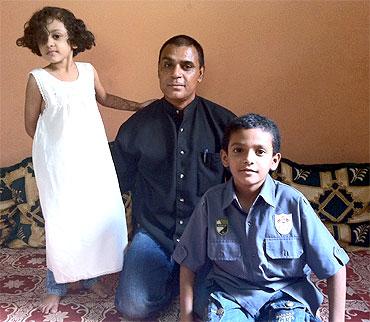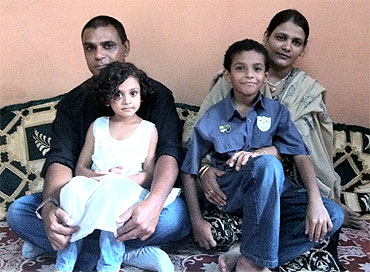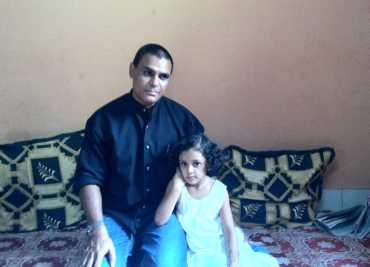 | « Back to article | Print this article |
Meet 'that man who was arrested for 9/11'
Mohammed Jaweed Azmath, who was wrongfully detained and tortured by US authorities after the 9/11 attacks, talks about his nightmarish ordeal to Vicky Nanjappa
A narrow road at the Doodh Gauli in Hyderabad leads up to the house. When I knock on the gate, an old lady emerges and says, "Mohammed Jaweed Azmath is away at work".
She refuses to give his cell phone number. A little later, Azmath's wife Tasleem Murad emerges, and says her husband will be home in a while.
Bilal, Azmath and Murad's son, comes out. He wants to shake hands. It is obvious he knows nothing about the trauma his family faced when he was born.
Azmath and his friend Gul Mohammed Shah were detained by the Federal Bureau of Investigation on the suspicion of being terrorists involved in the 9/11 conspiracy on September 12, 2001. They were released 16 months later, cleared of all terrorism charges.
Murad, who is a Pakistani, faced her own battle for the right to live in India.
Some time later, Azmath returns from work. He has his own business now. I tell him I am here to interview him because it's the 10th anniversary of 9/11. I apologise for raking up painful memories. He smiles and says, "I don't mind talking about it."
Azmath has sharp features like an Arab. He believes that's what landed him in trouble. The day after 9/11, he and Shah were traveling from New Jersey to Texas by train. A couple of people at the station informed the police about them and he was picked up along with others in connection with the 9/11 attacks investigation. They became known as the box-cutters because they had box-cutters when they were arrested.
Azmath says the months in detention were a nightmare.
'I was tortured, but never charged'
We had no clue what was happening and for nearly six months we did not have access to a lawyer. The interrogators insisted that it was best that I confessed to my crime. According to them I was aware of the 9/11 plot and I was concealing facts. They made me stand in freezing temperatures for days. One of the officials even tried to strike a deal with me and said all I needed to do was to confess and he would ensure that I would be out in no time. He also told me that there would be incentives such as a good job and lots of money if I confessed. I realised that they were playing me into a trap. I did not find it necessary to confess to something that I had not done," he says.
He continues, "I took all the torture and I believed that God would at least hear my prayers. They tortured me in detention, they hit me, but I was not ready to own up to something. I was innocent. We had with us box-cutters used to open bundles at a newsstand and they (the FBI) thought we used it for something else. Finally, I got justice from the court and was allowed to return to India to be with my family. It was mental trauma. I was tortured, but never charged. Today life appears to be settling down, but that trauma will never leave. When I returned to Hyderabad, the only source of support was my family. They were relieved that I was back and reassured me that everything will be fine. However, even now, sometimes I am referred to 'that man who was arrested for 9/11'. I know I have to leave the past behind me since we as a family have to survive."
September 11, he says, always sends "tremors up my spine." His wife says that as September 11 approaches, she starts to feel uneasy.
Azmath feels he was a victim of the political situation.
"Asian Muslims were under target and the US was only building up a ground to attack Iraq and Afghanistan. They wanted to show every Asian Muslim in poor light and depict them as terrorists. I was one of the victims," he says.
'The scars are too deep'
When I went to the US, I never imagined that this would ever happen to me. I was just doing my work. The people over there are very nice, and generally there is no discrimination. However, it was the government which had a different mindset at that point in time and even the people were paranoid (after 9/11)," he recalls.
Azmath has not told his son about the ordeal he had to undergo.
"He is too young," he says. "I will tell him for sure. Whether he would like to go to the US or not is entirely his choice. I will not stop him if he does want to go. What I have faced, I would not want for anyone. It is very painful for a family when they get to know about the detention of their loved one through television. For three months I had no contact with my family. I can well imagine what they must have gone through. To make matters worse, my wife was expecting at that time and the police here decided to deport her since she was a Pakistani. She had to fight that battle all alone."
His wife says she did not want to go to Pakistan, but wanted to wait for her husband.
"I got a favourable order from the court before my son was born," she says, adding that she has applied for Indian citizenship.
"I have a great deal of respect for the US judiciary. Thanks to them, after I came back, I have not been harassed by the local police. The judge told me that there would be no harassment for me once I was back in India. She also added that the US media was watching me and in case there was any harassment locally, they would make a hue and cry about it. The victimisation of Muslims is not just restricted to the US. I saw what happened to several innocent youth in Hyderabad after the Mecca Masjid attack," Azmath says.
Azmath wants to move on with his life, but "the scars are too deep and I know it is difficult. Sometimes I get angry with the system, but then I do realise there is no point. The US officials have not even bothered to tender an apology; that did anger me. I have sought compensation, and that battle is still on. I am happy and content that I have my family with me today. My son and daughter will be my biggest strength. I hope they are not traumatised unnecessarily for what I have gone through."


